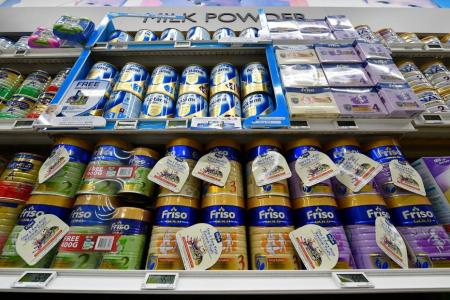Milk companies adhere to code on sale of infant formula
Instead, an ethics committee on infant food products says most violations are by third parties
Infant milk companies here have rarely violated the code of ethics on the sale of their milk products for children below six months of age.
The Sale of Infant Foods Ethics Committee Singapore (Sifecs), administered by the Health Promotion Board (HPB), receives 40 to 50 pieces of feedback each year.
Of these, five to 10 are verified to have violated Sifecs' code.
Among the recent violations, most involved third parties and not milk companies, said Sifecs chairman Ho Lai Yun, who revealed the figures in response to queries from The Straits Times.
Such companies have come under the spotlight recently, as a report by the Competition Commission of Singapore released last month found that they had engaged in "aggressive" marketing tactics, including inducements to private hospitals.
Such practices have entrenched brand loyalty and helped propel formula prices here to among the highest in the world.
The Sifecs code, last revised in 2011, has guidelines on the marketing and distribution of breast milk substitutes, including milk powder for infants aged up to six months.
In response to the report's findings, Sifecs said it will extend the code to formula for infants up to 12 months of age.
The latest review of the code started last November and is likely to be completed by the end of this year.
Adherence to the code is considered obligatory, but there are no penalties if someone breaches it.
Professor Ho, who is from the child development department at KK Women's and Children's Hospital, said: "All complaints that Sifecs receives will be investigated immediately.
VIOLATION
"Errant companies will be called up by the committee and given advice on the violations...
"Milk companies usually comply upon notification of the violation.
"In recent years, there have not been cases where there is serious violation of the code. Most of the recent violations involved third parties, not milk companies."
Prof Ho said some retailers breached guidelines over how products should be displayed or promoted.
The code states that point-of-sale materials are not allowed on shelves that contain milk products for infants aged up to six months.
The Singapore Infant Food Industry (Sifi) Self-Regulatory Committee, made up of the six major milk manufacturers here, was set up to evaluate marketing practices.
It is guided by the Sifecs code, among others, and is involved with the code's current review.
Ms Venetta Miranda, who heads its secretariat, said self-regulation is effective as the companies, which are competitors, are quick to point out alleged violations.
She also stressed that the milk tin labels must be approved by Sifecs and the Agri-Food and Veterinary Authority.
While the code bars financial inducements to hospitals, clinics and retail pharmacies to promote products for infants up to six months, payments and sponsorships by manufacturers to private hospitals for taking part in milk rotation programmes are not in violation, said Ms Miranda.
Consumers Association of Singapore president Lim Biow Chuan said he hopes to see the Sifecs code enhanced to cover all advertising and sponsorship arrangements.
Mr Lim, who is also the MP for Mountbatten, said: "The committee should also be empowered to enforce against non-compliance of the code."
FOR MORE, READ THE STRAITS TIMES TODAY
Get The New Paper on your phone with the free TNP app. Download from the Apple App Store or Google Play Store now



